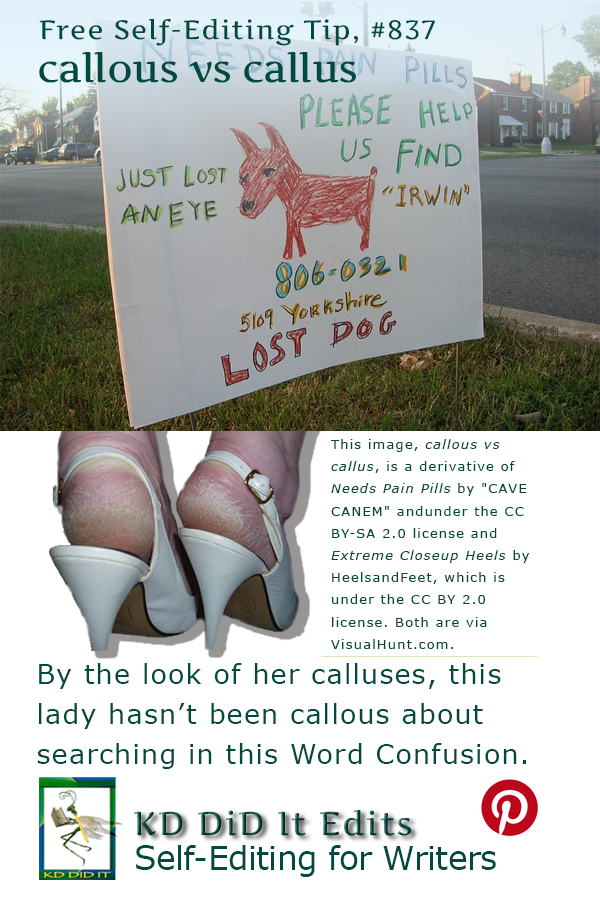Revised as of
1 Nov 2022
This confusion between callous and callus has certainly had me confused, as both refer to a hardening.
The figurative callous meaning a person who is less sensitive, hardened, someone with a lack of feeling and is similar to the literal callus, which is caused by friction or irritation over a period of time, leaving the irritated area less sensitive to the touch or having a lack of feeling.
So, you can see the difficulty. Whichever spelling you choose, don’t mix them up and do be consistent.
Word Confusions . . .
. . . started as my way of dealing with a professional frustration with properly spelled words that were out of context in manuscripts I was editing as well as books I was reviewing. It evolved into a sharing of information with y’all. I’m hoping you’ll share with us words that have been a bête noire for you from either end.
If you found this post on “Callous vs Callus” interesting, consider tweeting it to your friends. Subscribe to KD Did It, if you’d like to track this post for future updates.
| Callous | Callus |
|---|---|

Pollice Verso by Jean-Léon Gérôme is in the public domain, via Wikimedia Commons, and courtesy of the Phoenix Art Museum. — The audience is quite callous about the fate of the defeated. |

My Feet After Hiking, 16 July 2007, Zermatt, by Bossi is under the CC BY-SA 2.0 license, via Flickr. — Yep, you’ll get calluses if you don’t break your hiking boots in first. |
| Part of Grammar: | |
| Adjective; Verb
Third person present verb: callouses Alternate spelling: callus |
Noun; Verb, intransitive & transitive
Plural for the noun: calluses Third person present verb: calluses Alternate spelling: callous |
| Adjective: Showing or having an insensitive and cruel disregard for others Made hard
Insensitive
Having a callus
Verb: |
Noun: A thickened and hardened part of the skin or soft tissue, especially in an area that has been subjected to friction
Verb, intransitive: Verb, transitive: |
| Examples: | |
| Adjective: He is a callous man. His callous comments about the murder made me shiver. They have a callous attitude toward the sufferings of others. Governments have a callous indifference to suffering. “But, indeed, from what I saw, all these buccaneers were as callous as the sea they sailed on” (Stevenson). Verb: The long marches calloused the soldier’s feet. |
Noun: In these areas, the skin often thickens into a callus, which, when excessive, can lead to an ulcer. According to them, the genome of the ostrich has the ability to let the skin form calluses when the skin is abraded. But Mrs Ruthven warns the fad could lead to corns, bunions, calluses, claw toes, hammer toes — even arthritis and lower back problems. In the course of time, the callus is smoothed off and eventually the bone returns to its normal thickness. It normally takes one to two weeks for a callus to form, then about six weeks for the bone fragments to unite. When a patch of bark is removed from a tree the wound is healed by the formation of a callus which differentiates into periderm. The present paper describes the formation of surface callus on stem wounds of lime trees as observed by light and electron microscopy. Verb, intransitive: Verb, transitive: |
| Derivatives: | |
| Adjective: calloused, uncallous Adverb: callously, uncallously Noun: callousing, callousness |
Adjective: callose, callused, uncallused Noun: callose, callosity |
| History of the Word: | |
| Late Middle English (in the Latin sense) is from the Latin callosus meaning hard-skinned. | Mid-16th century, from the Latin callus (more commonly callum) meaning hardened skin. |
C’mon, get it out of your system, bitch, whine, moan…which words are your pet peeves?
Satisfy your curiosity about other Word Confusions on its homepage or more generally explore the index of self-editing posts. You may also want to more generally explore the index of self-editing posts. You may also want to explore Formatting Tips, Grammar Explanations, Linguistics, Publishing Tips, the Properly Punctuated, Writing Ideas and Resources, and Working Your Website.
Resources for Callous vs Callus
Some of these links may be affiliate links, and I will earn a small percentage, if you should buy it. It does not affect the price you pay.
Apple Dictionary.com
Dictionary.com: callous
Merriam-Webster: callous, callus
Perlman, Merrill. “The Difference Between ‘Callus’ and ‘Callous’.” Columbia Journalism Review.org. 30 July 2018. Web. 12 Jan 2020. <https://www.cjr.org/language_corner/callus-callous.php>.
Stevenson, Robert Louis. Treasure Island. Grapevine, 2019. <https://amzn.to/3Nnp5Cp>.
Pinterest Photo Credits:
Needs Pain Pills, <https://visualhunt.com/f3/photo/102196992/05db489bb4/>, by “CAVE CANEM”, <https://visualhunt.co/a4/e28db25f>, is under the CC BY-SA 2.0 license (the area code was removed) and Extreme Closeup Heels by HeelsandFeet, <https://visualhunt.com/f3/photo/431575336/8c364165fe/>, is under the CC BY 2.0 license. The background was removed and a shadow added. Both are via VisualHunt.com.


